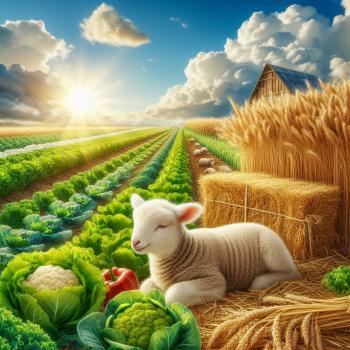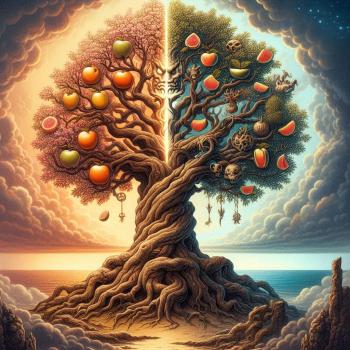
After Eve listened to the serpent and partook of the tree’s fruit, sharing some with her husband, both of their eyes were opened. Upon realizing their nakedness, they sewed fig leaves together to cover themselves. Later, they heard the presence of God in the garden during the cool of the day, prompting them to hide among the trees. The Lord called out to the man, asking, “Where are you?” The man replied that he hid because he was afraid because he was naked.
God then asked who had informed him of his nakedness and whether he had eaten from the forbidden tree. Adam explained that the woman whom God had given him offered him the fruit, and he ate it. “What have you done?” the Lord asked the woman. She responded that the serpent had deceived her, and she ate. As a result, God turned his attention to the serpent and began to announce the consequences for each party involved.
This article will primarily examine the statements made to the woman. A significant number of Christians believe that God’s declaration to her, signifies that she was now to be subordinate to her husband, who was expected to exert control over her. They argue that Adam and Eve’s sin somehow “altered the dynamics” of their relationship and though both were initially equal, the man is to now have authority over the woman. As a result, they reference this verse to claim that all women should submit to all men, and that no woman should preach the Gospel.
Over multiple posts, we will explore the clear reasons why this interpretation is flawed and analyze the passage to seek a deeper understanding of what God’s Word may truly convey. However, my intention here is not to make definitive claims but to investigate the various reasons why the traditional interpretation, handed down through generations, may be incorrect and rooted in a bias against women that has been damagingly upheld by religious leaders over the years.
Traditional Interpretation
Let’s begin by looking at Genesis 3:16 which reads:
To the woman he said, “I will greatly increase your pain in childbirth. You will bring forth children in pain. Your desire will be toward your husband, but he will rule over you.” (Gen. 3:16 CJB)
Unto the woman He said, `Multiplying I multiply thy sorrow and thy conception, in sorrow dost thou bear children, and toward thy husband [is] thy desire, and he doth rule over thee.’ (Gen. 3:16 YLT)
To the woman he said, “I will surely multiply your pain in childbearing; in pain you shall bring forth children. Your desire shall be contrary to your husband, but he shall rule over you.” (Gen. 3:16 ESV)
Traditionally, this verse is interpreted to mean exactly what the first translation (CJB) says. Because of the woman’s sin, she was now cursed to have pain while having children. This is why all women now have pain during labor. She will have some type of desire toward her husband—either some sexual desire or some desire to dominate him—yet her husband will rule over her.
Consequently, some conclude that because of this verse, all women are to be submissive to men, especially, within the church. But, let’s look at the verse more closely and see what we can make of it. First, let’s consider the obvious and rule out what the verse does not say. To start, it does not say that God cursed the woman. Second, it does not say that God will make all women now have physical pain while giving birth to children.
Third, it does not say that God will now make Eve have physical pain while giving birth to children. And fourth, it does not say that the woman must now be subject to her husband or that her husband was to have any type of God-given control over her. All of these are mere interpretations, but we will go deeper into that later. In the next section, we will break down each segment of the verse beginning with the pain of childbirth.
Pain In Childbirth
First, let me painfully point out the obvious, which unfortunately must be said: all women do not have children or suffer from pain in childbirth. Therefore, this verse does not refer to all women. It follows that whatever consequences are conveyed to this particular woman, are not necessarily applicable to all women, regardless of how imaginatively some might explain it.
Now, let’s look at what we can gather from a common sense viewpoint. In order for something to be multiplied or increased, that something has to already exist to begin with. In other words, more of something is added on to a measure of that same something that already exists, to increase it. Therefore, for the traditional understanding to be the case, that this portion of the verse refers to pain in child labor, then one of two things would need to have been true.
Scenario #1: Eve had kids in the garden before Cain, but they were easier births. But now, with all later births, her pain in labor would increase, making them severe.
Scenario #2: Eve hadn’t yet had children and there was going to be pain during childbirth to begin with, but now there would be an increase of pain. In other words, she’d never experienced labor before but now when she does experience it, the pain will be much greater than what was originally intended.
Although the Bible doesn’t mention any other children before Cain, the first scenario could very well be true. Eve could have already produced children while in the garden. There is no reason to believe that they waited until after they left the garden to begin fulfilling the Lords’ command to multiply. However, there is no mention of any children or anyone else in the garden besides these two, so we won’t speculate.
Scenario number two could be true but let’s be honest; it really doesn’t make any sense. Why would God inform her of this when she would have no idea what he was talking about and wouldn’t be able to tell the difference?
The bottom line is that this doesn’t seem to be speaking about physical pain during childbirth. In fact, that seems like a rather superficial interpretation. Fortunately, there is another interpretation that makes more sense, sounds less like a made-up myth of “how such and such came to be” and wouldn’t require so much speculation. Take a look at the Greek version of the first part of the verse and note the words highlighted in bold.
και τῇ γυναικὶ εἶπεν Πληθύνων πληθυνῶ τας λύπας σου, και τον στεναγμόν σου, ἐν λύπαις τέξῃ τέκνα
The Greek word lupe (λύπας/λύπαις) in this verse is commonly translated as “pain.” However, it can also translate to “grief” or “sorrow.” The LSJ also has an entry with the meaning, “pain of mind.” The Hebrew word that corresponds to lupe is itstsabown which means “worrisomeness, pain, or sorrow.” It comes from the word atsab which can mean “to grieve, hurt, be sorry or to vex.”
Next, we have the word stenagmos (στεναγμόν), which means groaning or sighing. This word is often translated as “conception” or “child-birth.” The corresponding word in Hebrew, is herayon meaning “pregnancy” or “conception.” Conception is a valid translation, however, it doesn’t necessarily refer to giving birth.
For instance, it can refer to conceiving something in the mind such as an idea or an acknowledgement of something, which is most likely what it means according to the context of the passage. It’s coming to an understanding or a realization of something. But how can sighing and conception be related?
If one comes to an understanding that their sin caused their negative situation, it could definitely lead to a state of sighing and groaning when they think upon it. This is a pattern that is found throughout the Bible.
“Pass throughout the city of Jerusalem,” the Lord said to him, “and put a mark on the foreheads of the men who sigh and groan over all the detestable practices committed in it.” — Ezek. 9:4 HCSB
4 (3) Your indignation left no part of me intact; my sin made my whole body sick; 5 (4) for my iniquities loom high over my head as a heavy burden, too heavy for me. 6 (5) I have stinking, festering wounds because of my foolishness. 7 (6) I am bent down, prostrate completely; I go about mourning all day long. 8 (7) For my insides burn with fever, and my whole body is sick. 9 (8) I am numb, completely crushed; my anguished heart makes me groan aloud. 10 (9) Adonai, all my longing is known to you; my sighing is not hidden from you. —Ps. 38:4-10 CJB
We know that the whole creation has been groaning as in the pains of childbirth right up to the present time. 23 Not only so, but we ourselves, who have the firstfruits of the Spirit, groan inwardly as we wait eagerly for our adoption to sonship, the redemption of our bodies. —Rom. 8:22-23 NIV
Additionally, groaning could still be associated with physical pregnancy. So, literally, the first part of the verse could read:
and to the woman he said of multiplying I will multiply the grief of you and the sighing/conception of you among sorrow you will bring forth descendants…
What could God have in mind here?: I will greatly increase your grief and understanding. Again, increase implies something already existed in a lesser amount. The understanding part could have easily come from the knowledge of right and wrong she gained from eating from the tree, and through her increasing knowledge she would begin to fully comprehend her broken state.
But, what grief would the woman already have at this point? It would have to be the sorrow and distress she felt concerning her sin and the outcome of it. It was the pain of mind she felt— the reason she was hiding from God, the reason she tried to cover herself with leaves.
Thus, this pain isn’t the physical pain that most women feel during childbirth but the grief and the sorrow that comes as a result of sin. Eve had already felt this sorrow, but now God would greatly multiply it. But how? Well, being kicked out of paradise is likely to cause one grief. Also losing that close intimate fellowship with your Creator and having to figure things out on your own because you thought you knew better than the one who made you, could be stressful.
And the worst part? Knowing you were the one who catapulted it all, by disobeying God rather than trusting in him and teaching his commandments to your offspring. Yep. That would definitely keep me awake at night. Essentially, God would add to her sorrow by allowing her to follow her own desires, and remain on the path she had set off on. Whatever it was that captivated her enough to turn away from God, she was now going to get more than a taste of it. In other words, she would get the whole shebang.
She would no longer dwell in innocence under the protective care of her Creator but as she desired, she would be sent out to live and make it on her own and to do things her own way. However, what she will find in this situation is sorrow as God leaves her to her own devices. And among that sorrow, she would bring forth descendants. These descendants would further increase her grief. How?
Think of one-child-killing-the-other type of grief. Or worrying about your murderous son being cast out of the Lord’s sight with people wanting to kill him. Mix in sickness, disease, and other wickedness and common hardships and you’ve got yourself a recipe for endless grief. The deviation she started by moving away from the safety of God’s guidance would continue and increase through her descendants. This would cause the state of wickedness we read about through Genesis up to the present day.
Thus, I believe the Lord’s statement to the woman wasn’t just directed toward her, but had future implications for all of humankind. The grief she would feel would by extension, be grief felt for all of her descendants; for the sorrow we would also experience. Therefore, Eve’s grief would indeed be multiplied and would indeed be great, but as in quantity not quality, as it is a grief that all of us feel to some extent.
So, ultimately, this statement seems to be speaking more about a mental grief and pain that reaches all of humanity, passed down from the “mother of all the living,” rather than a story of why women, in general, have pain during labor.
Another Possibility
Still, I propose that there is a more straightforward, yet equally valid way to interpret this statement: I will greatly increase your toil and your pregnancy. It’s clear that the man and woman had duties to fulfill in the garden. Thus, God might be indicating to the woman that due to their actions, he would now add to their workload; in other words, he would increase the effort needed for their survival by expelling them from the garden, where their tasks were likely less demanding.
Now, given that God typically accompanies bad news with a promise of grace and hope, reflecting his loving correction, he might be assuring the woman that he will increase her ability to bear children to match the increased workload. After all, what would be negative about him telling her that he will multiply her pregnancy, especially when he was the one who told them to be fruitful and multiply?
In essence, they would have more helpers to assist with the labor, which is evident from the narrative of Cain and Abel, where one son worked the fields and the other tended to the livestock. This interpretation seems plausible, especially since God then addresses Adam, informing him about the ground being cursed because of his actions and the ensuing laborious toil.
I believe that either of these interpretations would be more appropriate and more consistent with biblical teachings and real-world accuracy than the idea that God aimlessly punished the woman by inflicting physical pain on her and all women during childbirth. This does not reflect God’s character; rather, it reflects human tendencies.
But regardless of which interpretation might be true, there is a fundamental truth about both: Although the woman’s anguish or labor may increase and extend to all humanity, as is usually the case, God has a purpose for it: to lead people back to him through godly sorrow, as godly sorrow leads to repentance (2 Cor. 7:10). Simply obeying rules is not enough. God seeks a heartfelt change—one that encourages us to turn back to him sincerely, ready to follow him in love, ready to call upon his name.
What better way to achieve this than by realizing how desperately we need him, both physically and spiritually? Our need for him is greater than anything else as he is the source of our very existence. Next, let’s begin to look at what is probably the most controversial and least understood part of the verse and attempt to understand its meaning: Your desire will be for your husband.














